Comprehensive Analysis: Introduction to Church History Assignment
VerifiedAdded on 2022/11/25
|18
|4113
|321
Homework Assignment
AI Summary
This assignment delves into the intricacies of Church History, exploring key figures, doctrines, and historical events. It begins by examining Martin Luther's conversion and his core doctrines, followed by an analysis of John Calvin's teachings. The assignment then explores the Anabaptist movement and the Council of Trent, highlighting their impact on the Christian Church. It further investigates Methodism, Marxism's perspective on Christianity, and the Church's role during the apartheid era in South Africa. The assignment also covers Christian humanism and its influential figures, providing a comprehensive overview of significant historical developments and theological perspectives within the Church.
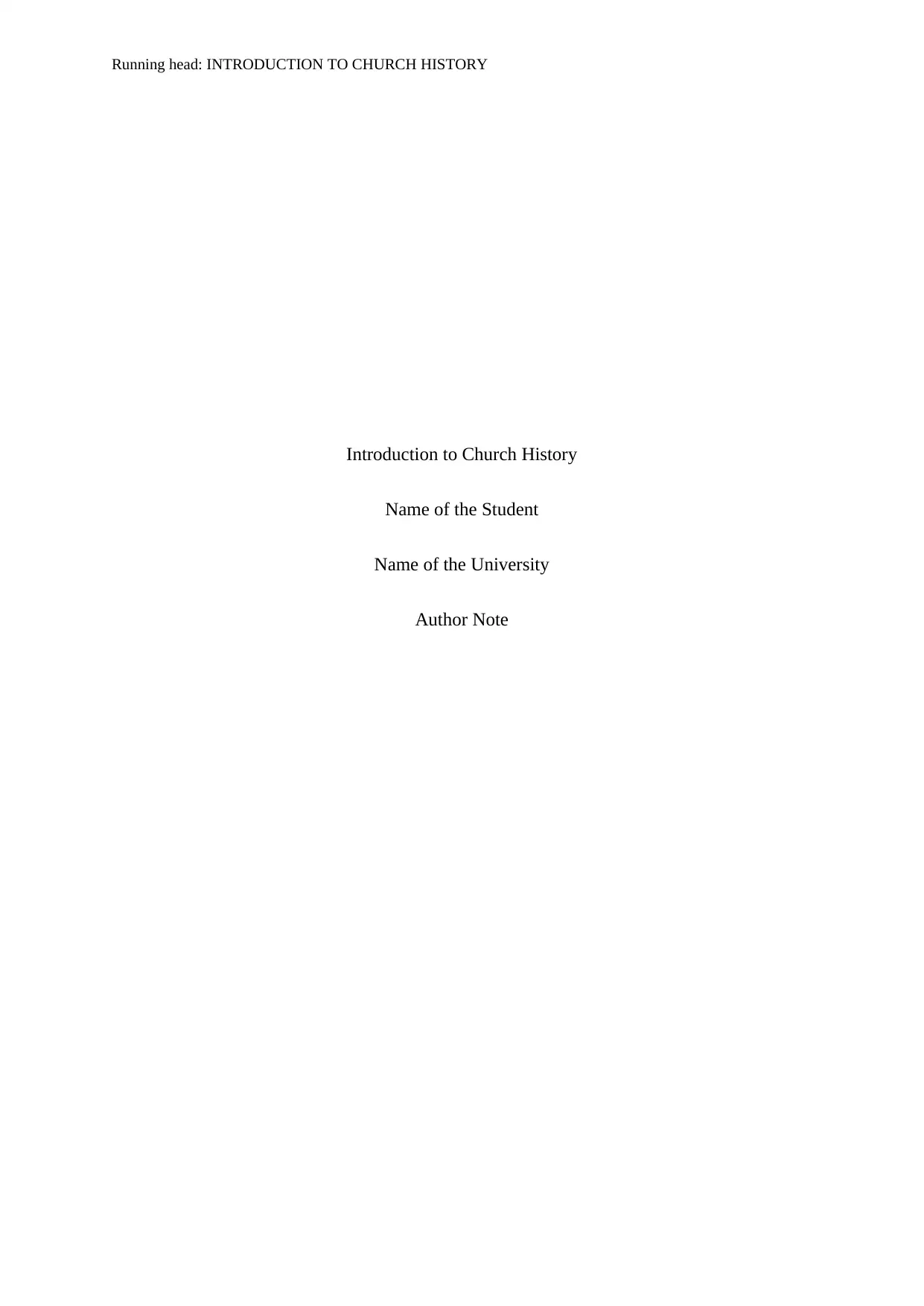
Running head: INTRODUCTION TO CHURCH HISTORY
Introduction to Church History
Name of the Student
Name of the University
Author Note
Introduction to Church History
Name of the Student
Name of the University
Author Note
Paraphrase This Document
Need a fresh take? Get an instant paraphrase of this document with our AI Paraphraser
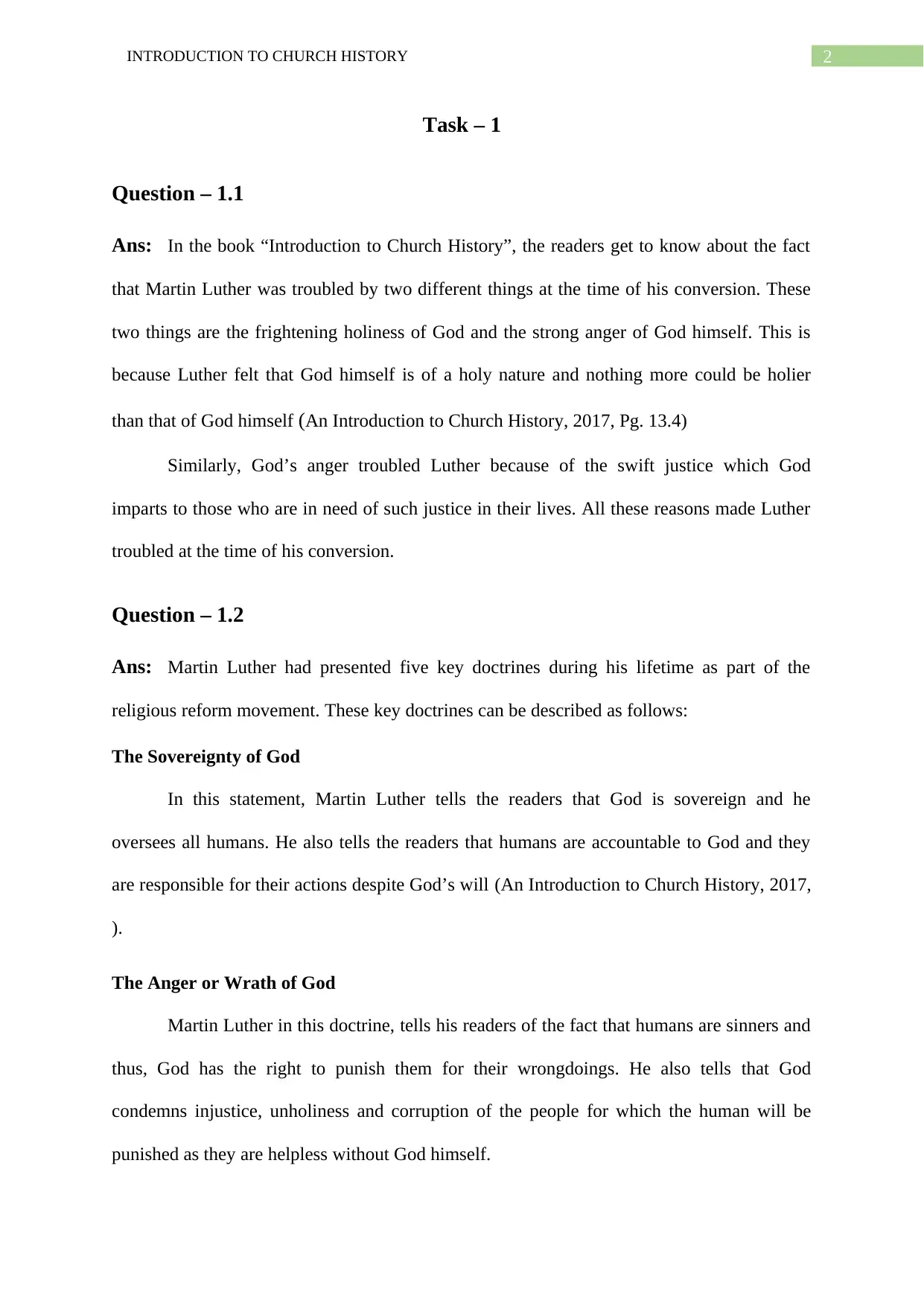
2INTRODUCTION TO CHURCH HISTORY
Task – 1
Question – 1.1
Ans: In the book “Introduction to Church History”, the readers get to know about the fact
that Martin Luther was troubled by two different things at the time of his conversion. These
two things are the frightening holiness of God and the strong anger of God himself. This is
because Luther felt that God himself is of a holy nature and nothing more could be holier
than that of God himself (An Introduction to Church History, 2017, Pg. 13.4)
Similarly, God’s anger troubled Luther because of the swift justice which God
imparts to those who are in need of such justice in their lives. All these reasons made Luther
troubled at the time of his conversion.
Question – 1.2
Ans: Martin Luther had presented five key doctrines during his lifetime as part of the
religious reform movement. These key doctrines can be described as follows:
The Sovereignty of God
In this statement, Martin Luther tells the readers that God is sovereign and he
oversees all humans. He also tells the readers that humans are accountable to God and they
are responsible for their actions despite God’s will (An Introduction to Church History, 2017,
).
The Anger or Wrath of God
Martin Luther in this doctrine, tells his readers of the fact that humans are sinners and
thus, God has the right to punish them for their wrongdoings. He also tells that God
condemns injustice, unholiness and corruption of the people for which the human will be
punished as they are helpless without God himself.
Task – 1
Question – 1.1
Ans: In the book “Introduction to Church History”, the readers get to know about the fact
that Martin Luther was troubled by two different things at the time of his conversion. These
two things are the frightening holiness of God and the strong anger of God himself. This is
because Luther felt that God himself is of a holy nature and nothing more could be holier
than that of God himself (An Introduction to Church History, 2017, Pg. 13.4)
Similarly, God’s anger troubled Luther because of the swift justice which God
imparts to those who are in need of such justice in their lives. All these reasons made Luther
troubled at the time of his conversion.
Question – 1.2
Ans: Martin Luther had presented five key doctrines during his lifetime as part of the
religious reform movement. These key doctrines can be described as follows:
The Sovereignty of God
In this statement, Martin Luther tells the readers that God is sovereign and he
oversees all humans. He also tells the readers that humans are accountable to God and they
are responsible for their actions despite God’s will (An Introduction to Church History, 2017,
).
The Anger or Wrath of God
Martin Luther in this doctrine, tells his readers of the fact that humans are sinners and
thus, God has the right to punish them for their wrongdoings. He also tells that God
condemns injustice, unholiness and corruption of the people for which the human will be
punished as they are helpless without God himself.
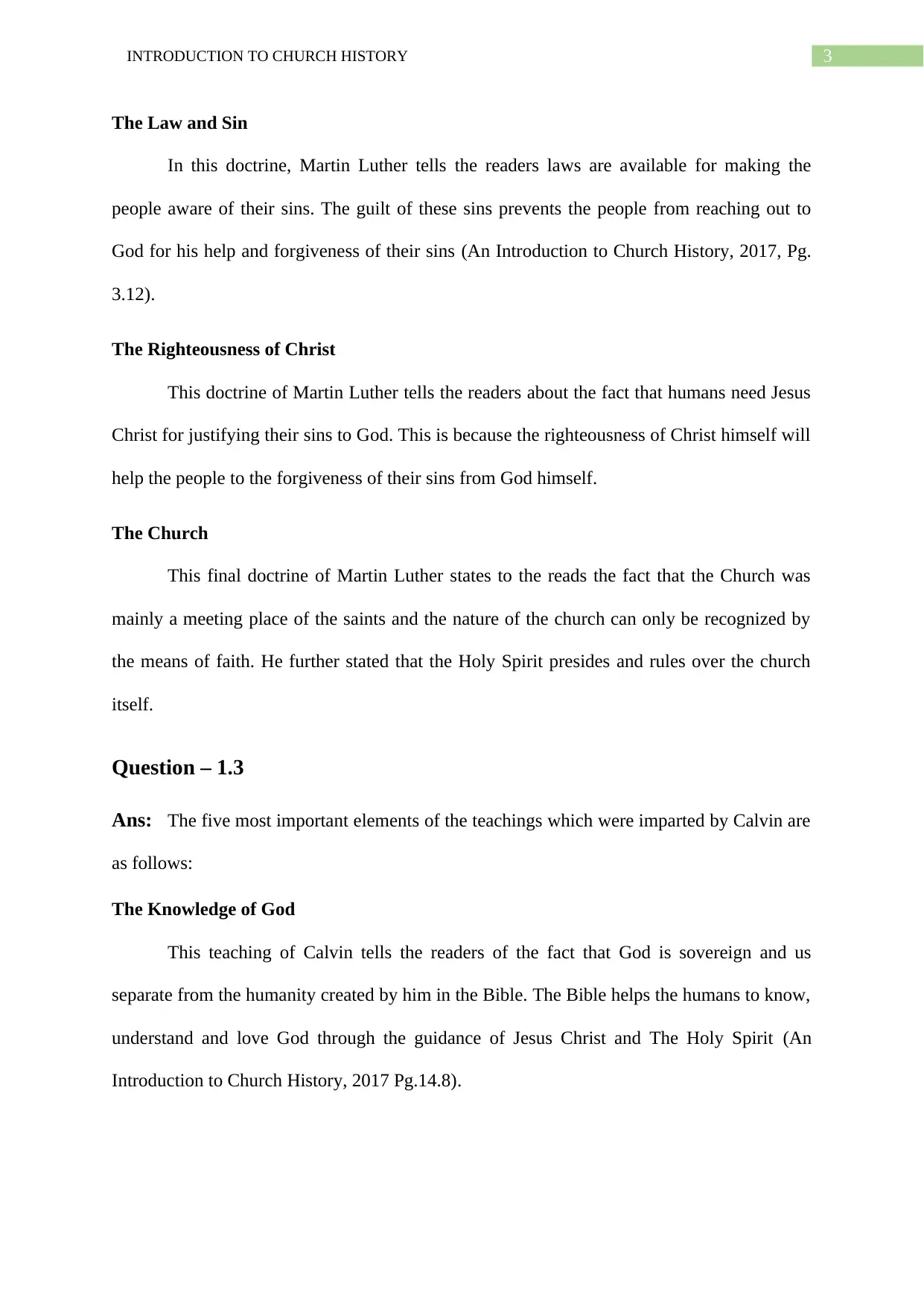
3INTRODUCTION TO CHURCH HISTORY
The Law and Sin
In this doctrine, Martin Luther tells the readers laws are available for making the
people aware of their sins. The guilt of these sins prevents the people from reaching out to
God for his help and forgiveness of their sins (An Introduction to Church History, 2017, Pg.
3.12).
The Righteousness of Christ
This doctrine of Martin Luther tells the readers about the fact that humans need Jesus
Christ for justifying their sins to God. This is because the righteousness of Christ himself will
help the people to the forgiveness of their sins from God himself.
The Church
This final doctrine of Martin Luther states to the reads the fact that the Church was
mainly a meeting place of the saints and the nature of the church can only be recognized by
the means of faith. He further stated that the Holy Spirit presides and rules over the church
itself.
Question – 1.3
Ans: The five most important elements of the teachings which were imparted by Calvin are
as follows:
The Knowledge of God
This teaching of Calvin tells the readers of the fact that God is sovereign and us
separate from the humanity created by him in the Bible. The Bible helps the humans to know,
understand and love God through the guidance of Jesus Christ and The Holy Spirit (An
Introduction to Church History, 2017 Pg.14.8).
The Law and Sin
In this doctrine, Martin Luther tells the readers laws are available for making the
people aware of their sins. The guilt of these sins prevents the people from reaching out to
God for his help and forgiveness of their sins (An Introduction to Church History, 2017, Pg.
3.12).
The Righteousness of Christ
This doctrine of Martin Luther tells the readers about the fact that humans need Jesus
Christ for justifying their sins to God. This is because the righteousness of Christ himself will
help the people to the forgiveness of their sins from God himself.
The Church
This final doctrine of Martin Luther states to the reads the fact that the Church was
mainly a meeting place of the saints and the nature of the church can only be recognized by
the means of faith. He further stated that the Holy Spirit presides and rules over the church
itself.
Question – 1.3
Ans: The five most important elements of the teachings which were imparted by Calvin are
as follows:
The Knowledge of God
This teaching of Calvin tells the readers of the fact that God is sovereign and us
separate from the humanity created by him in the Bible. The Bible helps the humans to know,
understand and love God through the guidance of Jesus Christ and The Holy Spirit (An
Introduction to Church History, 2017 Pg.14.8).
⊘ This is a preview!⊘
Do you want full access?
Subscribe today to unlock all pages.

Trusted by 1+ million students worldwide
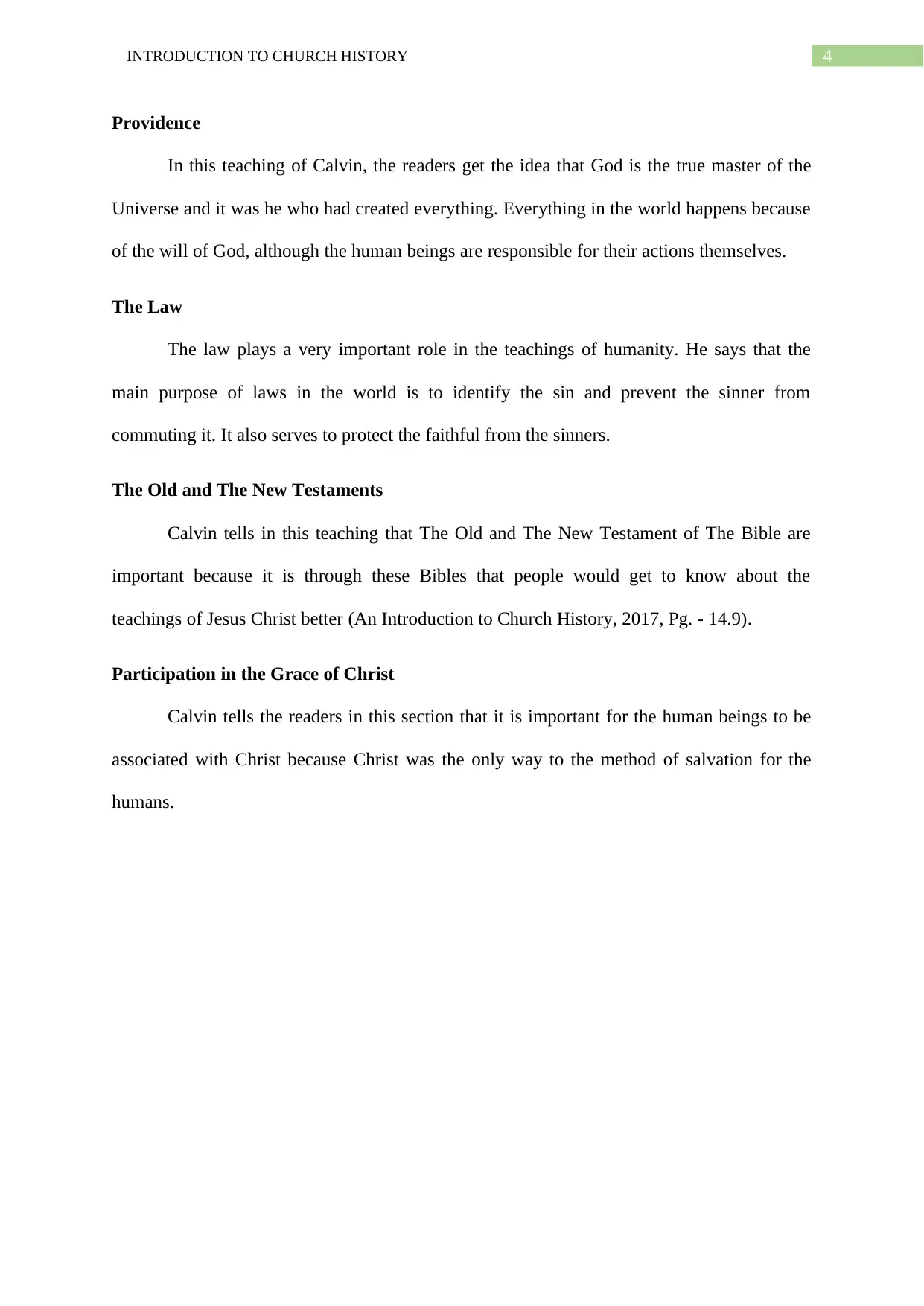
4INTRODUCTION TO CHURCH HISTORY
Providence
In this teaching of Calvin, the readers get the idea that God is the true master of the
Universe and it was he who had created everything. Everything in the world happens because
of the will of God, although the human beings are responsible for their actions themselves.
The Law
The law plays a very important role in the teachings of humanity. He says that the
main purpose of laws in the world is to identify the sin and prevent the sinner from
commuting it. It also serves to protect the faithful from the sinners.
The Old and The New Testaments
Calvin tells in this teaching that The Old and The New Testament of The Bible are
important because it is through these Bibles that people would get to know about the
teachings of Jesus Christ better (An Introduction to Church History, 2017, Pg. - 14.9).
Participation in the Grace of Christ
Calvin tells the readers in this section that it is important for the human beings to be
associated with Christ because Christ was the only way to the method of salvation for the
humans.
Providence
In this teaching of Calvin, the readers get the idea that God is the true master of the
Universe and it was he who had created everything. Everything in the world happens because
of the will of God, although the human beings are responsible for their actions themselves.
The Law
The law plays a very important role in the teachings of humanity. He says that the
main purpose of laws in the world is to identify the sin and prevent the sinner from
commuting it. It also serves to protect the faithful from the sinners.
The Old and The New Testaments
Calvin tells in this teaching that The Old and The New Testament of The Bible are
important because it is through these Bibles that people would get to know about the
teachings of Jesus Christ better (An Introduction to Church History, 2017, Pg. - 14.9).
Participation in the Grace of Christ
Calvin tells the readers in this section that it is important for the human beings to be
associated with Christ because Christ was the only way to the method of salvation for the
humans.
Paraphrase This Document
Need a fresh take? Get an instant paraphrase of this document with our AI Paraphraser
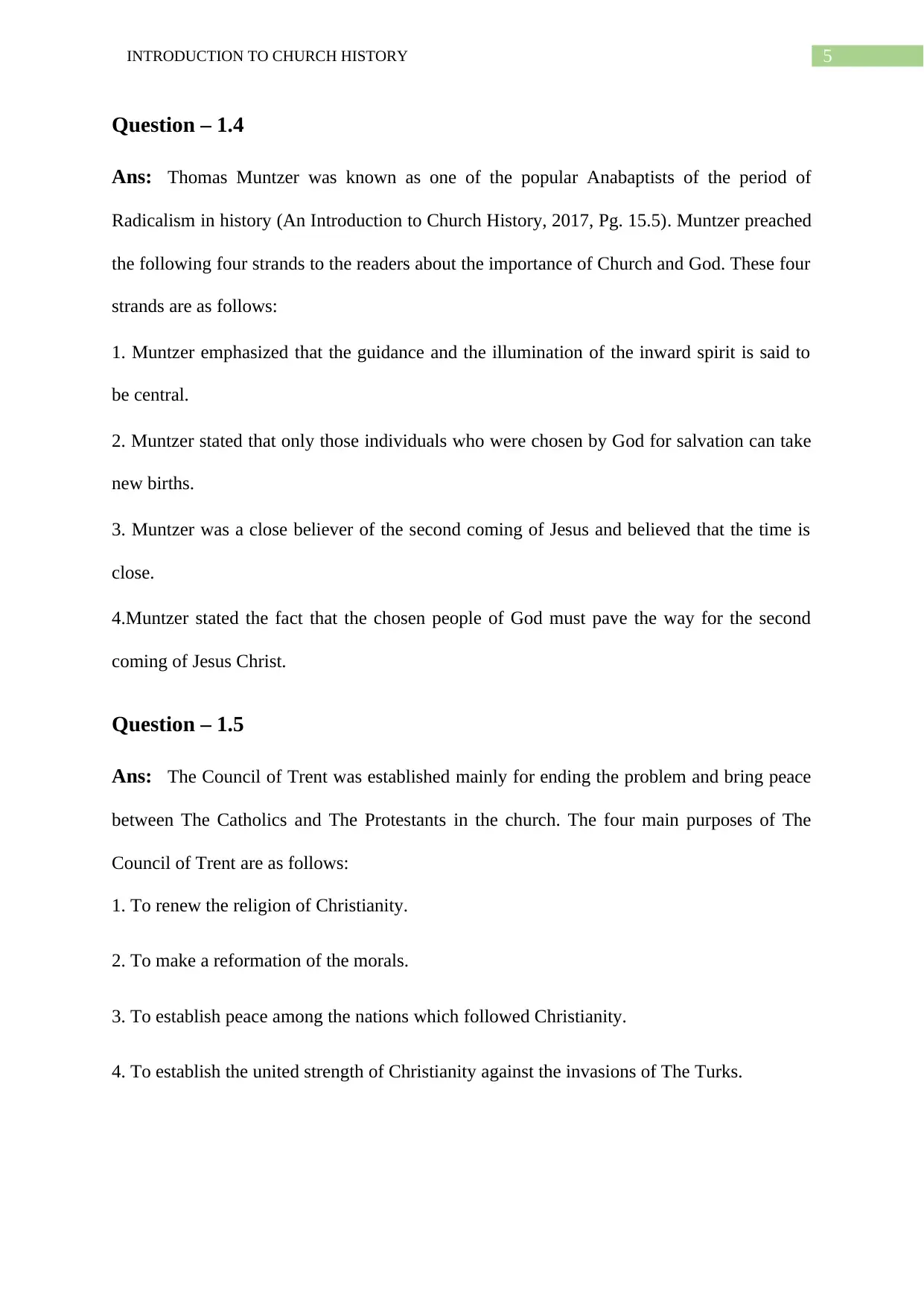
5INTRODUCTION TO CHURCH HISTORY
Question – 1.4
Ans: Thomas Muntzer was known as one of the popular Anabaptists of the period of
Radicalism in history (An Introduction to Church History, 2017, Pg. 15.5). Muntzer preached
the following four strands to the readers about the importance of Church and God. These four
strands are as follows:
1. Muntzer emphasized that the guidance and the illumination of the inward spirit is said to
be central.
2. Muntzer stated that only those individuals who were chosen by God for salvation can take
new births.
3. Muntzer was a close believer of the second coming of Jesus and believed that the time is
close.
4.Muntzer stated the fact that the chosen people of God must pave the way for the second
coming of Jesus Christ.
Question – 1.5
Ans: The Council of Trent was established mainly for ending the problem and bring peace
between The Catholics and The Protestants in the church. The four main purposes of The
Council of Trent are as follows:
1. To renew the religion of Christianity.
2. To make a reformation of the morals.
3. To establish peace among the nations which followed Christianity.
4. To establish the united strength of Christianity against the invasions of The Turks.
Question – 1.4
Ans: Thomas Muntzer was known as one of the popular Anabaptists of the period of
Radicalism in history (An Introduction to Church History, 2017, Pg. 15.5). Muntzer preached
the following four strands to the readers about the importance of Church and God. These four
strands are as follows:
1. Muntzer emphasized that the guidance and the illumination of the inward spirit is said to
be central.
2. Muntzer stated that only those individuals who were chosen by God for salvation can take
new births.
3. Muntzer was a close believer of the second coming of Jesus and believed that the time is
close.
4.Muntzer stated the fact that the chosen people of God must pave the way for the second
coming of Jesus Christ.
Question – 1.5
Ans: The Council of Trent was established mainly for ending the problem and bring peace
between The Catholics and The Protestants in the church. The four main purposes of The
Council of Trent are as follows:
1. To renew the religion of Christianity.
2. To make a reformation of the morals.
3. To establish peace among the nations which followed Christianity.
4. To establish the united strength of Christianity against the invasions of The Turks.
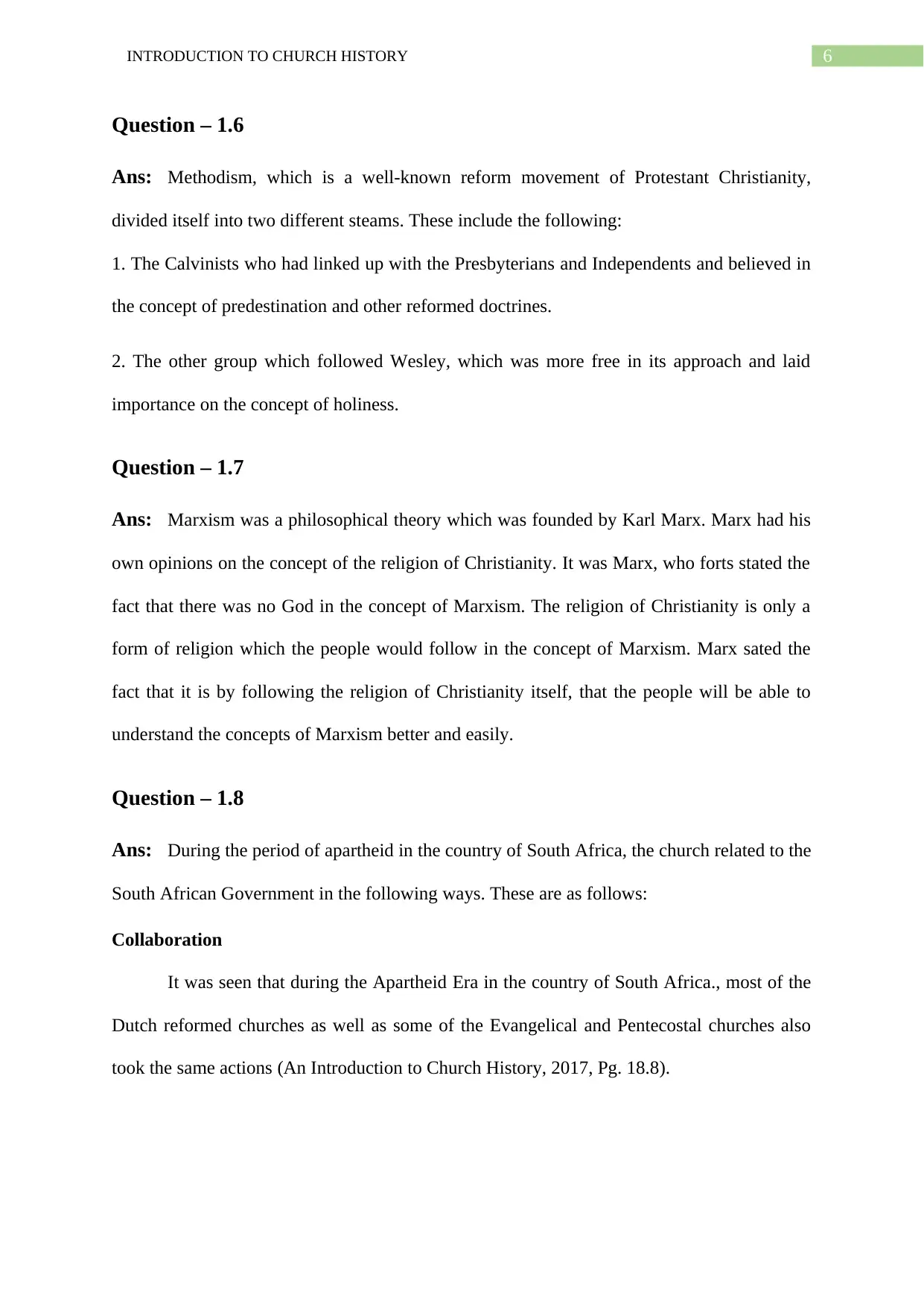
6INTRODUCTION TO CHURCH HISTORY
Question – 1.6
Ans: Methodism, which is a well-known reform movement of Protestant Christianity,
divided itself into two different steams. These include the following:
1. The Calvinists who had linked up with the Presbyterians and Independents and believed in
the concept of predestination and other reformed doctrines.
2. The other group which followed Wesley, which was more free in its approach and laid
importance on the concept of holiness.
Question – 1.7
Ans: Marxism was a philosophical theory which was founded by Karl Marx. Marx had his
own opinions on the concept of the religion of Christianity. It was Marx, who forts stated the
fact that there was no God in the concept of Marxism. The religion of Christianity is only a
form of religion which the people would follow in the concept of Marxism. Marx sated the
fact that it is by following the religion of Christianity itself, that the people will be able to
understand the concepts of Marxism better and easily.
Question – 1.8
Ans: During the period of apartheid in the country of South Africa, the church related to the
South African Government in the following ways. These are as follows:
Collaboration
It was seen that during the Apartheid Era in the country of South Africa., most of the
Dutch reformed churches as well as some of the Evangelical and Pentecostal churches also
took the same actions (An Introduction to Church History, 2017, Pg. 18.8).
Question – 1.6
Ans: Methodism, which is a well-known reform movement of Protestant Christianity,
divided itself into two different steams. These include the following:
1. The Calvinists who had linked up with the Presbyterians and Independents and believed in
the concept of predestination and other reformed doctrines.
2. The other group which followed Wesley, which was more free in its approach and laid
importance on the concept of holiness.
Question – 1.7
Ans: Marxism was a philosophical theory which was founded by Karl Marx. Marx had his
own opinions on the concept of the religion of Christianity. It was Marx, who forts stated the
fact that there was no God in the concept of Marxism. The religion of Christianity is only a
form of religion which the people would follow in the concept of Marxism. Marx sated the
fact that it is by following the religion of Christianity itself, that the people will be able to
understand the concepts of Marxism better and easily.
Question – 1.8
Ans: During the period of apartheid in the country of South Africa, the church related to the
South African Government in the following ways. These are as follows:
Collaboration
It was seen that during the Apartheid Era in the country of South Africa., most of the
Dutch reformed churches as well as some of the Evangelical and Pentecostal churches also
took the same actions (An Introduction to Church History, 2017, Pg. 18.8).
⊘ This is a preview!⊘
Do you want full access?
Subscribe today to unlock all pages.

Trusted by 1+ million students worldwide
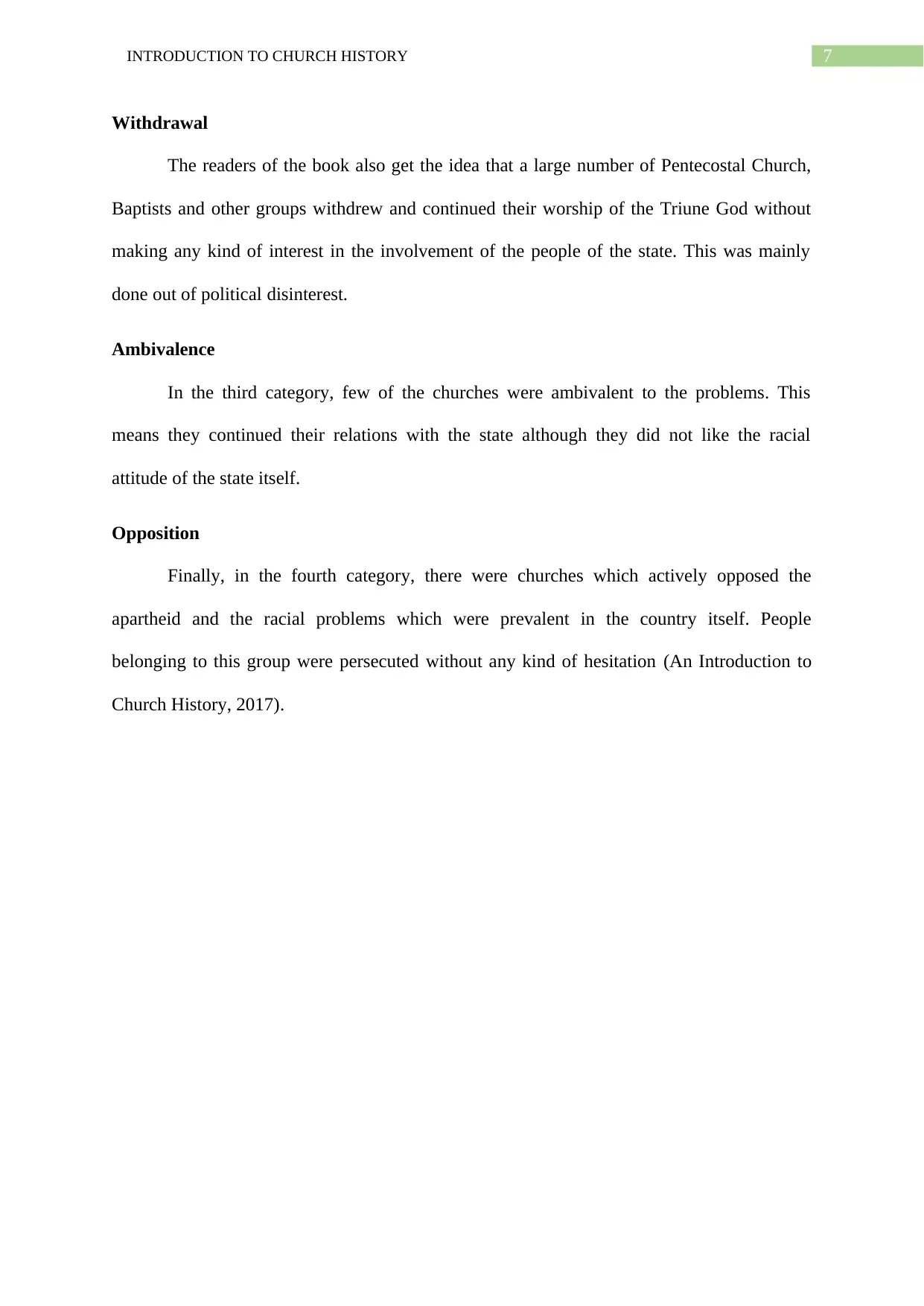
7INTRODUCTION TO CHURCH HISTORY
Withdrawal
The readers of the book also get the idea that a large number of Pentecostal Church,
Baptists and other groups withdrew and continued their worship of the Triune God without
making any kind of interest in the involvement of the people of the state. This was mainly
done out of political disinterest.
Ambivalence
In the third category, few of the churches were ambivalent to the problems. This
means they continued their relations with the state although they did not like the racial
attitude of the state itself.
Opposition
Finally, in the fourth category, there were churches which actively opposed the
apartheid and the racial problems which were prevalent in the country itself. People
belonging to this group were persecuted without any kind of hesitation (An Introduction to
Church History, 2017).
Withdrawal
The readers of the book also get the idea that a large number of Pentecostal Church,
Baptists and other groups withdrew and continued their worship of the Triune God without
making any kind of interest in the involvement of the people of the state. This was mainly
done out of political disinterest.
Ambivalence
In the third category, few of the churches were ambivalent to the problems. This
means they continued their relations with the state although they did not like the racial
attitude of the state itself.
Opposition
Finally, in the fourth category, there were churches which actively opposed the
apartheid and the racial problems which were prevalent in the country itself. People
belonging to this group were persecuted without any kind of hesitation (An Introduction to
Church History, 2017).
Paraphrase This Document
Need a fresh take? Get an instant paraphrase of this document with our AI Paraphraser
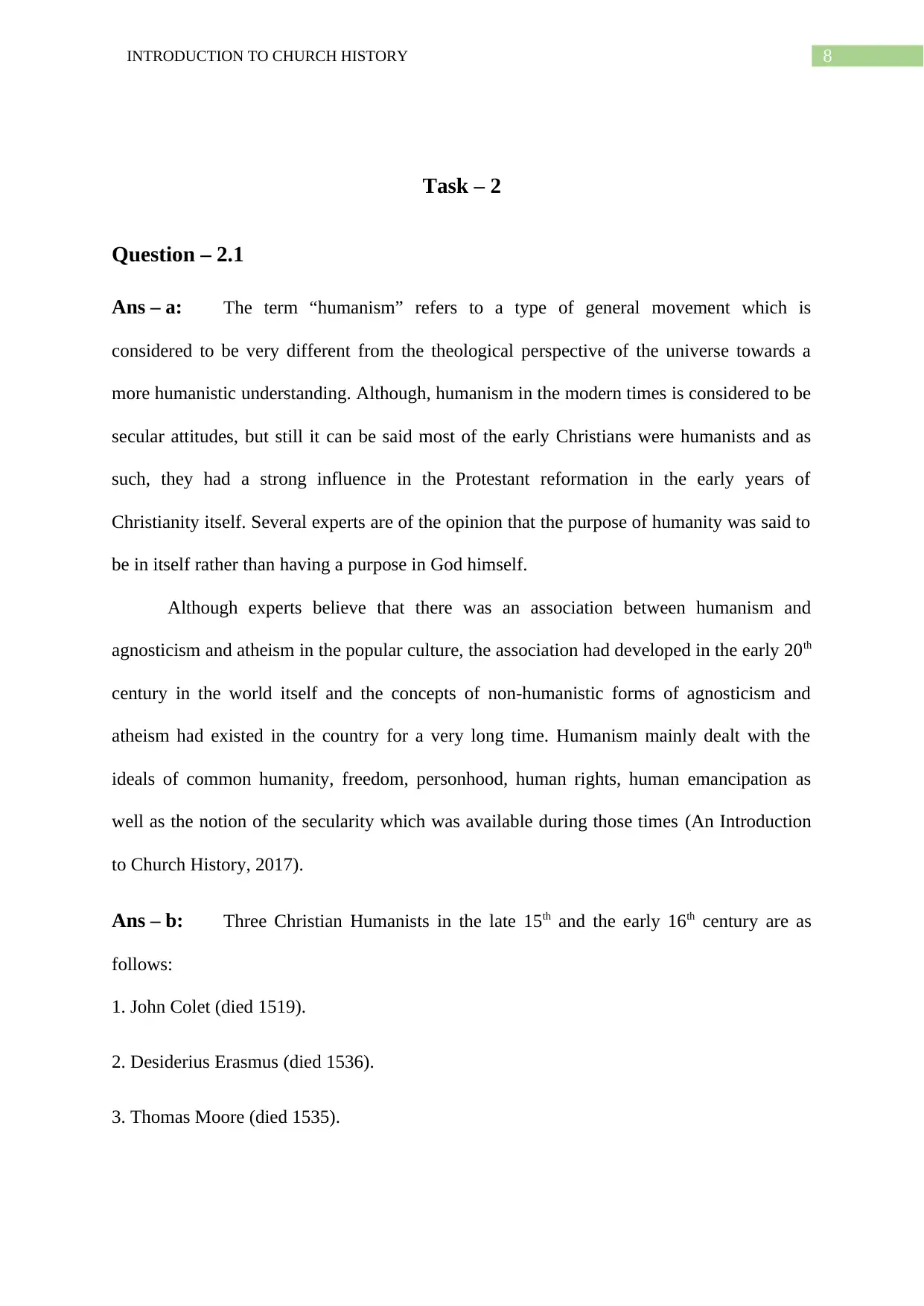
8INTRODUCTION TO CHURCH HISTORY
Task – 2
Question – 2.1
Ans – a: The term “humanism” refers to a type of general movement which is
considered to be very different from the theological perspective of the universe towards a
more humanistic understanding. Although, humanism in the modern times is considered to be
secular attitudes, but still it can be said most of the early Christians were humanists and as
such, they had a strong influence in the Protestant reformation in the early years of
Christianity itself. Several experts are of the opinion that the purpose of humanity was said to
be in itself rather than having a purpose in God himself.
Although experts believe that there was an association between humanism and
agnosticism and atheism in the popular culture, the association had developed in the early 20th
century in the world itself and the concepts of non-humanistic forms of agnosticism and
atheism had existed in the country for a very long time. Humanism mainly dealt with the
ideals of common humanity, freedom, personhood, human rights, human emancipation as
well as the notion of the secularity which was available during those times (An Introduction
to Church History, 2017).
Ans – b: Three Christian Humanists in the late 15th and the early 16th century are as
follows:
1. John Colet (died 1519).
2. Desiderius Erasmus (died 1536).
3. Thomas Moore (died 1535).
Task – 2
Question – 2.1
Ans – a: The term “humanism” refers to a type of general movement which is
considered to be very different from the theological perspective of the universe towards a
more humanistic understanding. Although, humanism in the modern times is considered to be
secular attitudes, but still it can be said most of the early Christians were humanists and as
such, they had a strong influence in the Protestant reformation in the early years of
Christianity itself. Several experts are of the opinion that the purpose of humanity was said to
be in itself rather than having a purpose in God himself.
Although experts believe that there was an association between humanism and
agnosticism and atheism in the popular culture, the association had developed in the early 20th
century in the world itself and the concepts of non-humanistic forms of agnosticism and
atheism had existed in the country for a very long time. Humanism mainly dealt with the
ideals of common humanity, freedom, personhood, human rights, human emancipation as
well as the notion of the secularity which was available during those times (An Introduction
to Church History, 2017).
Ans – b: Three Christian Humanists in the late 15th and the early 16th century are as
follows:
1. John Colet (died 1519).
2. Desiderius Erasmus (died 1536).
3. Thomas Moore (died 1535).
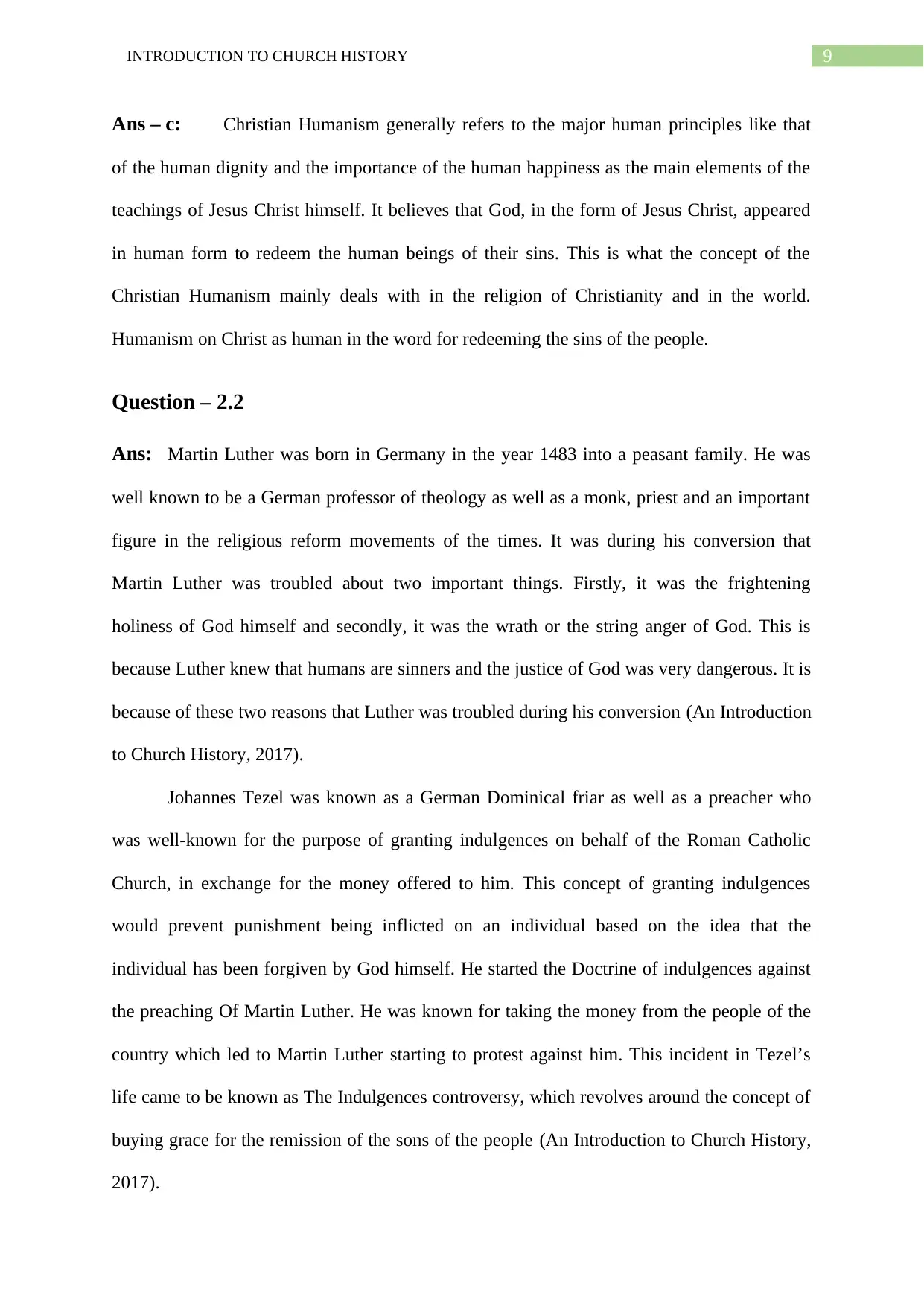
9INTRODUCTION TO CHURCH HISTORY
Ans – c: Christian Humanism generally refers to the major human principles like that
of the human dignity and the importance of the human happiness as the main elements of the
teachings of Jesus Christ himself. It believes that God, in the form of Jesus Christ, appeared
in human form to redeem the human beings of their sins. This is what the concept of the
Christian Humanism mainly deals with in the religion of Christianity and in the world.
Humanism on Christ as human in the word for redeeming the sins of the people.
Question – 2.2
Ans: Martin Luther was born in Germany in the year 1483 into a peasant family. He was
well known to be a German professor of theology as well as a monk, priest and an important
figure in the religious reform movements of the times. It was during his conversion that
Martin Luther was troubled about two important things. Firstly, it was the frightening
holiness of God himself and secondly, it was the wrath or the string anger of God. This is
because Luther knew that humans are sinners and the justice of God was very dangerous. It is
because of these two reasons that Luther was troubled during his conversion (An Introduction
to Church History, 2017).
Johannes Tezel was known as a German Dominical friar as well as a preacher who
was well-known for the purpose of granting indulgences on behalf of the Roman Catholic
Church, in exchange for the money offered to him. This concept of granting indulgences
would prevent punishment being inflicted on an individual based on the idea that the
individual has been forgiven by God himself. He started the Doctrine of indulgences against
the preaching Of Martin Luther. He was known for taking the money from the people of the
country which led to Martin Luther starting to protest against him. This incident in Tezel’s
life came to be known as The Indulgences controversy, which revolves around the concept of
buying grace for the remission of the sons of the people (An Introduction to Church History,
2017).
Ans – c: Christian Humanism generally refers to the major human principles like that
of the human dignity and the importance of the human happiness as the main elements of the
teachings of Jesus Christ himself. It believes that God, in the form of Jesus Christ, appeared
in human form to redeem the human beings of their sins. This is what the concept of the
Christian Humanism mainly deals with in the religion of Christianity and in the world.
Humanism on Christ as human in the word for redeeming the sins of the people.
Question – 2.2
Ans: Martin Luther was born in Germany in the year 1483 into a peasant family. He was
well known to be a German professor of theology as well as a monk, priest and an important
figure in the religious reform movements of the times. It was during his conversion that
Martin Luther was troubled about two important things. Firstly, it was the frightening
holiness of God himself and secondly, it was the wrath or the string anger of God. This is
because Luther knew that humans are sinners and the justice of God was very dangerous. It is
because of these two reasons that Luther was troubled during his conversion (An Introduction
to Church History, 2017).
Johannes Tezel was known as a German Dominical friar as well as a preacher who
was well-known for the purpose of granting indulgences on behalf of the Roman Catholic
Church, in exchange for the money offered to him. This concept of granting indulgences
would prevent punishment being inflicted on an individual based on the idea that the
individual has been forgiven by God himself. He started the Doctrine of indulgences against
the preaching Of Martin Luther. He was known for taking the money from the people of the
country which led to Martin Luther starting to protest against him. This incident in Tezel’s
life came to be known as The Indulgences controversy, which revolves around the concept of
buying grace for the remission of the sons of the people (An Introduction to Church History,
2017).
⊘ This is a preview!⊘
Do you want full access?
Subscribe today to unlock all pages.

Trusted by 1+ million students worldwide
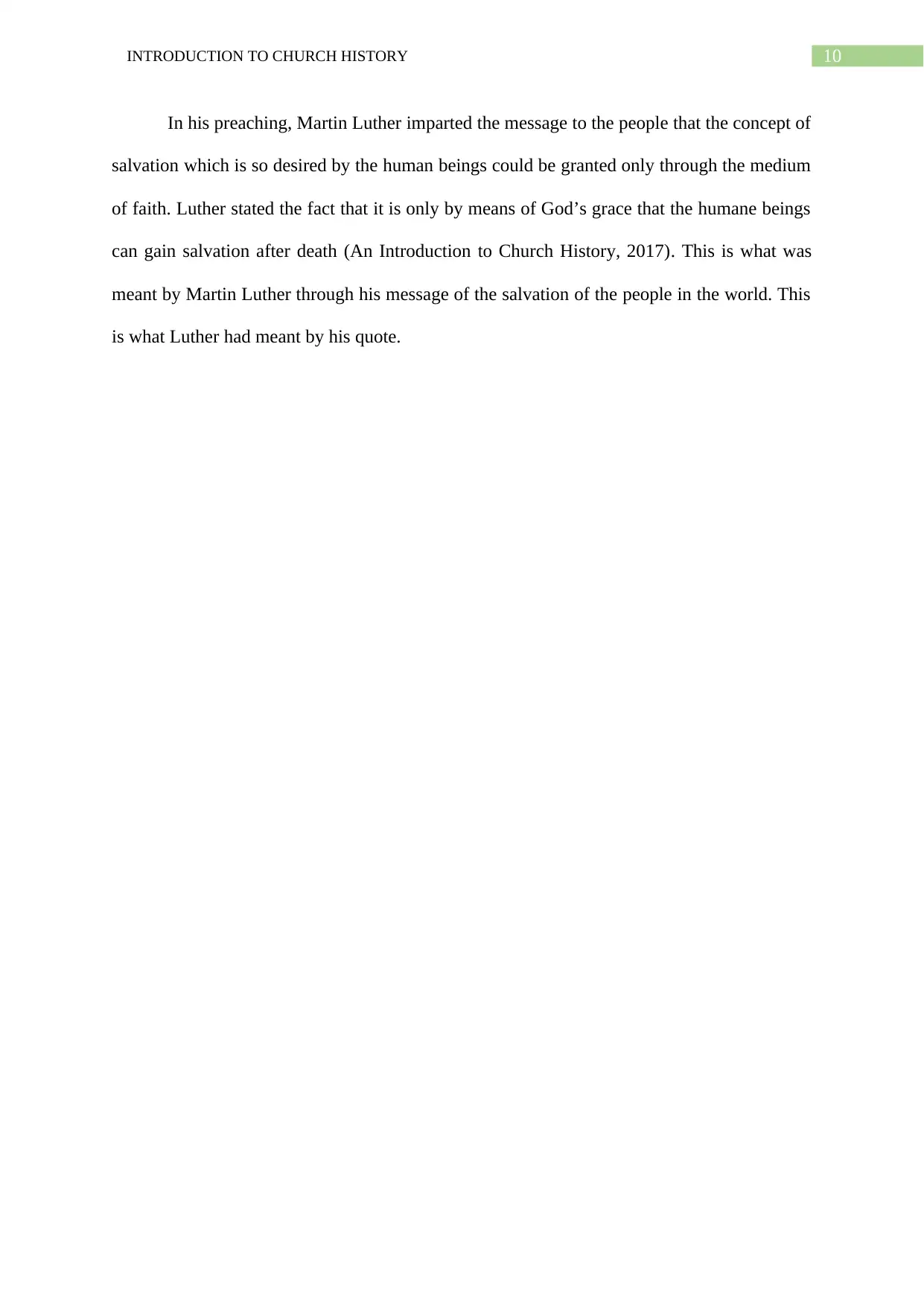
10INTRODUCTION TO CHURCH HISTORY
In his preaching, Martin Luther imparted the message to the people that the concept of
salvation which is so desired by the human beings could be granted only through the medium
of faith. Luther stated the fact that it is only by means of God’s grace that the humane beings
can gain salvation after death (An Introduction to Church History, 2017). This is what was
meant by Martin Luther through his message of the salvation of the people in the world. This
is what Luther had meant by his quote.
In his preaching, Martin Luther imparted the message to the people that the concept of
salvation which is so desired by the human beings could be granted only through the medium
of faith. Luther stated the fact that it is only by means of God’s grace that the humane beings
can gain salvation after death (An Introduction to Church History, 2017). This is what was
meant by Martin Luther through his message of the salvation of the people in the world. This
is what Luther had meant by his quote.
Paraphrase This Document
Need a fresh take? Get an instant paraphrase of this document with our AI Paraphraser
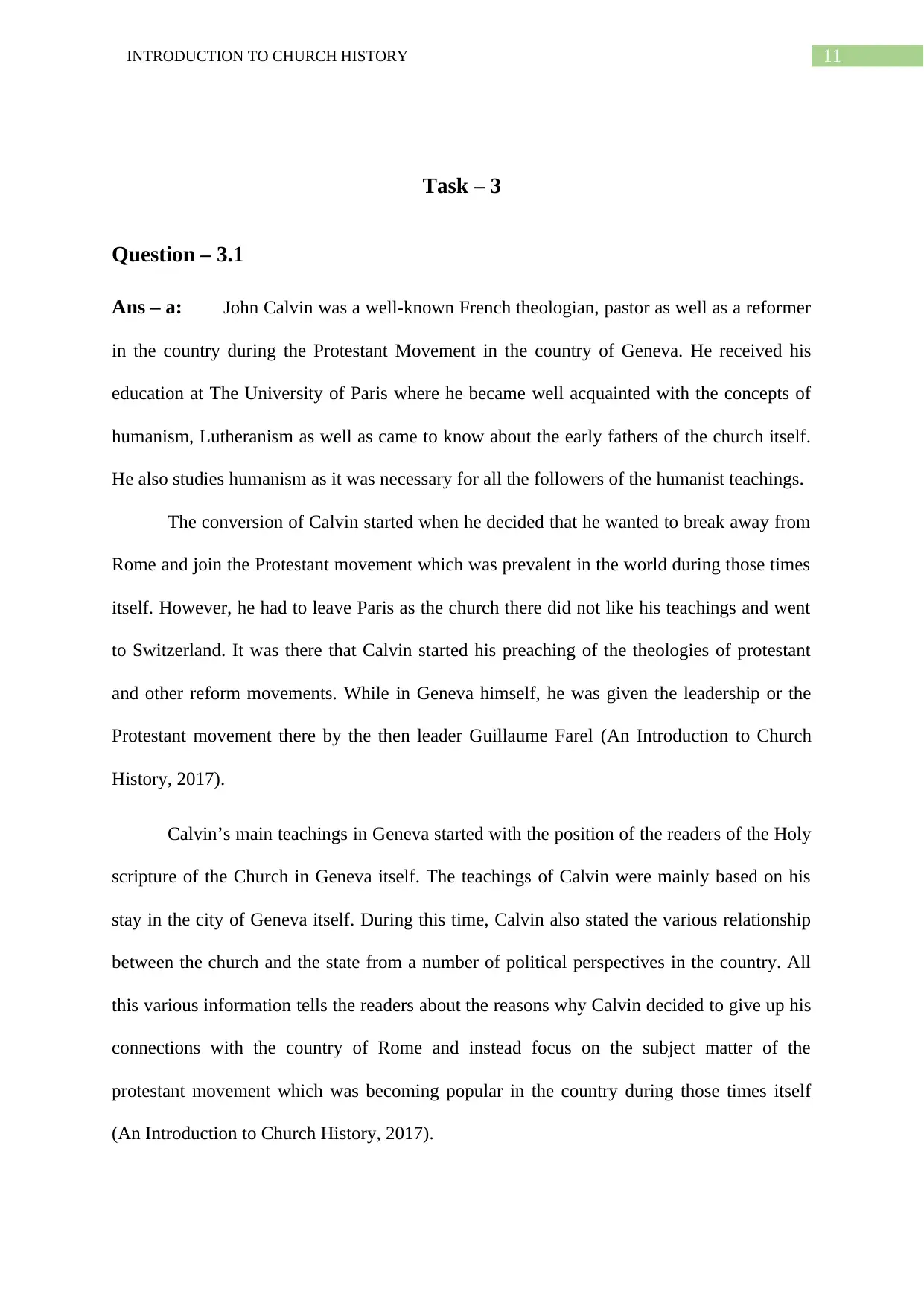
11INTRODUCTION TO CHURCH HISTORY
Task – 3
Question – 3.1
Ans – a: John Calvin was a well-known French theologian, pastor as well as a reformer
in the country during the Protestant Movement in the country of Geneva. He received his
education at The University of Paris where he became well acquainted with the concepts of
humanism, Lutheranism as well as came to know about the early fathers of the church itself.
He also studies humanism as it was necessary for all the followers of the humanist teachings.
The conversion of Calvin started when he decided that he wanted to break away from
Rome and join the Protestant movement which was prevalent in the world during those times
itself. However, he had to leave Paris as the church there did not like his teachings and went
to Switzerland. It was there that Calvin started his preaching of the theologies of protestant
and other reform movements. While in Geneva himself, he was given the leadership or the
Protestant movement there by the then leader Guillaume Farel (An Introduction to Church
History, 2017).
Calvin’s main teachings in Geneva started with the position of the readers of the Holy
scripture of the Church in Geneva itself. The teachings of Calvin were mainly based on his
stay in the city of Geneva itself. During this time, Calvin also stated the various relationship
between the church and the state from a number of political perspectives in the country. All
this various information tells the readers about the reasons why Calvin decided to give up his
connections with the country of Rome and instead focus on the subject matter of the
protestant movement which was becoming popular in the country during those times itself
(An Introduction to Church History, 2017).
Task – 3
Question – 3.1
Ans – a: John Calvin was a well-known French theologian, pastor as well as a reformer
in the country during the Protestant Movement in the country of Geneva. He received his
education at The University of Paris where he became well acquainted with the concepts of
humanism, Lutheranism as well as came to know about the early fathers of the church itself.
He also studies humanism as it was necessary for all the followers of the humanist teachings.
The conversion of Calvin started when he decided that he wanted to break away from
Rome and join the Protestant movement which was prevalent in the world during those times
itself. However, he had to leave Paris as the church there did not like his teachings and went
to Switzerland. It was there that Calvin started his preaching of the theologies of protestant
and other reform movements. While in Geneva himself, he was given the leadership or the
Protestant movement there by the then leader Guillaume Farel (An Introduction to Church
History, 2017).
Calvin’s main teachings in Geneva started with the position of the readers of the Holy
scripture of the Church in Geneva itself. The teachings of Calvin were mainly based on his
stay in the city of Geneva itself. During this time, Calvin also stated the various relationship
between the church and the state from a number of political perspectives in the country. All
this various information tells the readers about the reasons why Calvin decided to give up his
connections with the country of Rome and instead focus on the subject matter of the
protestant movement which was becoming popular in the country during those times itself
(An Introduction to Church History, 2017).
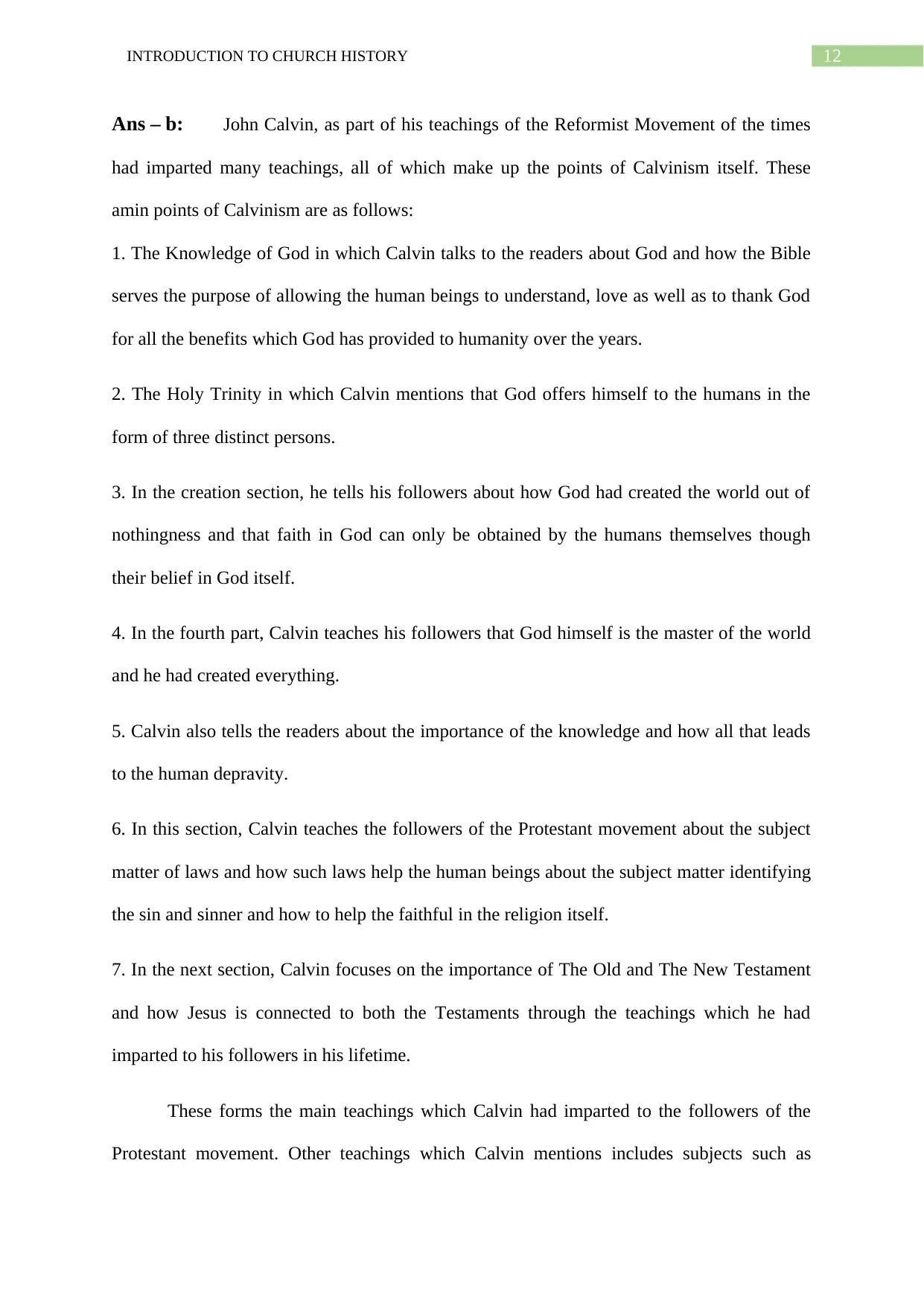
12INTRODUCTION TO CHURCH HISTORY
Ans – b: John Calvin, as part of his teachings of the Reformist Movement of the times
had imparted many teachings, all of which make up the points of Calvinism itself. These
amin points of Calvinism are as follows:
1. The Knowledge of God in which Calvin talks to the readers about God and how the Bible
serves the purpose of allowing the human beings to understand, love as well as to thank God
for all the benefits which God has provided to humanity over the years.
2. The Holy Trinity in which Calvin mentions that God offers himself to the humans in the
form of three distinct persons.
3. In the creation section, he tells his followers about how God had created the world out of
nothingness and that faith in God can only be obtained by the humans themselves though
their belief in God itself.
4. In the fourth part, Calvin teaches his followers that God himself is the master of the world
and he had created everything.
5. Calvin also tells the readers about the importance of the knowledge and how all that leads
to the human depravity.
6. In this section, Calvin teaches the followers of the Protestant movement about the subject
matter of laws and how such laws help the human beings about the subject matter identifying
the sin and sinner and how to help the faithful in the religion itself.
7. In the next section, Calvin focuses on the importance of The Old and The New Testament
and how Jesus is connected to both the Testaments through the teachings which he had
imparted to his followers in his lifetime.
These forms the main teachings which Calvin had imparted to the followers of the
Protestant movement. Other teachings which Calvin mentions includes subjects such as
Ans – b: John Calvin, as part of his teachings of the Reformist Movement of the times
had imparted many teachings, all of which make up the points of Calvinism itself. These
amin points of Calvinism are as follows:
1. The Knowledge of God in which Calvin talks to the readers about God and how the Bible
serves the purpose of allowing the human beings to understand, love as well as to thank God
for all the benefits which God has provided to humanity over the years.
2. The Holy Trinity in which Calvin mentions that God offers himself to the humans in the
form of three distinct persons.
3. In the creation section, he tells his followers about how God had created the world out of
nothingness and that faith in God can only be obtained by the humans themselves though
their belief in God itself.
4. In the fourth part, Calvin teaches his followers that God himself is the master of the world
and he had created everything.
5. Calvin also tells the readers about the importance of the knowledge and how all that leads
to the human depravity.
6. In this section, Calvin teaches the followers of the Protestant movement about the subject
matter of laws and how such laws help the human beings about the subject matter identifying
the sin and sinner and how to help the faithful in the religion itself.
7. In the next section, Calvin focuses on the importance of The Old and The New Testament
and how Jesus is connected to both the Testaments through the teachings which he had
imparted to his followers in his lifetime.
These forms the main teachings which Calvin had imparted to the followers of the
Protestant movement. Other teachings which Calvin mentions includes subjects such as
⊘ This is a preview!⊘
Do you want full access?
Subscribe today to unlock all pages.

Trusted by 1+ million students worldwide
1 out of 18
Related Documents
Your All-in-One AI-Powered Toolkit for Academic Success.
+13062052269
info@desklib.com
Available 24*7 on WhatsApp / Email
![[object Object]](/_next/static/media/star-bottom.7253800d.svg)
Unlock your academic potential
Copyright © 2020–2025 A2Z Services. All Rights Reserved. Developed and managed by ZUCOL.



